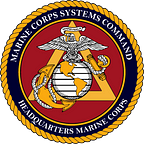#PeopleFirst: NDAA symposium explores the past, present and future of defense acquisition laws
By Matt Gonzales, MCSC Office of Public Affairs and Communication
Marine Corps Systems Command continues its mission to enhance the skills and knowledge of its workforce.
On April 4, dozens of acquisition professionals packed the historic Pavilion at Gari Melcher’s Belmont in Falmouth, Virginia, to learn more about the National Defense Authorization Act. The NDAA is a federal law specifying the budget and expenditures of the Department of Defense.
Hosted by MCSC’s Director of Operations and Programs, the event featured guest speakers with diverse experience and professional perspectives from government, industry and academia.
“The idea here is for the speakers to talk about things that are of interest to us,” Terri Conte, PM competency manager at MCSC, said in her opening remarks.
The purpose of the symposium was to inform and engage MCSC’s acquisition community about the NDAA process and various NDAA-related topics relevant to executing Marine Corps acquisition programs.
Thomas Frankfurt and Louise Vitale shared a panel and were the first to speak to the crowd.
Frankfurt is the chief acquisition attorney for the Department of the Navy and the senior legal advisor to the Assistant Secretary of the Navy, Research, Development and Acquisition. Vitale is a legal counselor in the Department of Navy’s Office of Legislative Affairs.
Congress has expressed some concern about the defense acquisition community’s procurement efforts as well as the efficiency of the process, said Vitale.
“From 2016 to 2018, Congress thought our acquisition process was slowing us down,” said Frankfurt. “The process had become so bloated that they wanted to streamline it and make it accessible to commercial and nontraditional contractors. So, they did that by passing more laws.”
In 2016, lawmakers aimed to help speed up the acquisition process. In Section 804 of the 2016 NDAA, Congress granted a rapid acquisition approach that focuses on delivering a capability in two to five years.
“The purpose of Section 804 is not only to go faster, but to cancel programs when they don’t work,” said Frankfurt. “It allows for experimentation and prototyping.”
Jon Etherton also spoke at the event. Etherton has 35 years of experience working with the DOD, the Senate Armed Services Committee and various federal agencies on acquisition policy and national security funding.
Etherton reviewed past NDAA topics and outlined the NDAA process for fiscal year 2020, which begins with budget requests to Congress on March 12 and ends with the bill reaching the House and Senate floor in July.
“I think once the bill gets to the floor, other issues, such as debt ceiling, will come to a screeching halt,” said Etherton.
Etherton also covered fiscal year 2020 acquisition policy issues, including the need to adapt at the speed of an ever-changing world, leverage the dynamic marketplace, effectively allocate resources, enable the workforce and simplify the acquisition process.
“I see a lot happening in the coming months,” he said. “It should be an interesting spring and pretty lively summer.”
Etherton joined a panel with Chelsey Penrod-Hickman, who served as a senior Republican staffer on Capitol Hill for over 10 years. Both emphasized the importance of respectfully explaining to policymakers and their staffs the significance of certain aspects of defense acquisition.
“Let the staff know how important having certain authorities in place impacts your job, your constituents or the military as a whole,” said Penrod-Hickman. “They don’t want to take away authorities that you need to do your job.”
Etherton noted how many lawmakers value the military and want to ensure that the Marine Corps and other branches receive the necessary funding to successfully do their jobs.
“If you can explain this in detail to them, that’d help them better understand,” he said. “Their ultimate objective is to support you.”
The event also included speeches from Dakota Wood, senior research fellow for defense programs at The Heritage Foundation, and Mark Harkins of the Government Affairs Institute about non-DOD perspectives and influences on the NDAA.
Later in the day, Andrew Philip Hunter, senior fellow in the International Security Program, talked about acquisition reform. Retired Rear Adm. Tom Kearney, who served in the U.S. Navy for more than 30 years, also spoke at the symposium.
The event helped expand the audience’s understanding of NDAA laws. MCSC’s Director of Operations and Programs will host other programs in the future intended to enhance the skills of its workforce.
